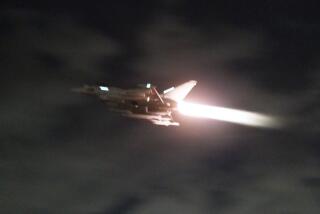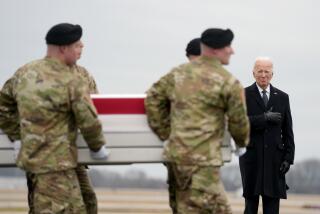Would Raid Syria, Iran, Reagan Says : He Threatens Libya-Type Attacks if Other Nations Are Tied to Terror Acts
- Share via
WASHINGTON — President Reagan said Wednesday that if he had solid information linking Syria and Iran to terrorist incidents he would not hesitate to attack their capitals just as he ordered an air raid on Libyan targets last week after learning that Libya was behind the bombing of a West Berlin discotheque in which an American serviceman was killed.
“We must have the same policy,” Reagan said at a news briefing. “State-supported terrorism is a form of warfare and we just can’t sit by and let somebody else declare war.”
Reagan’s critics have contended that he singled out Libya for retaliation because it is a relatively weak nation, while allowing the more strategically important states of Syria and Iran to go unchallenged despite their similar sponsorship of terrorism.
The President did not address that charge but said it is “much more difficult to trace to the source terrorism sponsored by others than it is with Libya.” The regime of Col. Moammar Kadafi has openly supported terrorist groups, he explained, while the roles of Syria and Iran in such incidents have proven elusive.
“Everybody that’s out to take a crack at us, he’s willing to support,” Reagan said of the Libyan leader.
But if he had “the same irrefutable evidence” on Syria and Iran that “we had with him,” Reagan said, he would endorse military action.
When asked what he thought of reports that Kadafi planned to invite the Soviet Union to establish a naval base in Libya, Reagan said he “questioned very much” that the Soviets would be interested. Asked why the Soviets would back away from such an invitation, Reagan responded in a mischievous tone, “I think maybe they have a case of the smarts.”
Several top Administration officials appeared with Reagan to brief the press but only on conditions that their names not be published. One said he believes that the Soviets are “hesitant to re-engage with Ronald Reagan” because of his “powerful performance” at the Geneva summit last November.
‘A Lousy Reason’
The same official also said that the Soviets had offered “a lousy reason” for canceling a summit preparatory meeting scheduled next month between Secretary of State George P. Shultz and Soviet Foreign Minister Eduard A. Shevardnadze.
The Soviets cited the Administration’s attack on Libya as their reason for withdrawing from the meeting.
“They ought to be joining us in fighting terrorism,” the official said.
Despite his harsh words, Reagan and his top aides said that a summit meeting with Soviet leader Mikhail S. Gorbachev is still likely later this year, probably in November, after the congressional elections.
In other briefings for reporters on the eve of Reagan’s departure Friday for an economic summit meeting with the allies in Tokyo, Administration officials defended the President’s terrorism policy and said that Libya is “not the only culprit, but a clear culprit” in fomenting terrorism around the world.
They said they are encouraged that the allies recognize Libya’s overriding role and, despite their differences with Reagan over the use of military force, are prepared to join with the United States in some fashion in combatting terrorism.
World Dimensions
“We see a clear recognition everywhere that terrorism is a major problem of international dimensions that needs to be fought on an international, collaborative basis,” said one official.
This official said that the United States is “beginning to see some payoff” in continuing discussions with its allies about how to respond to Kadafi’s regime. He cited “huge payoffs” in heightened intelligence capacity because of allied cooperation and said a number of terrorist incidents have been thwarted because of it.
“We have lots of information that two years ago we just wouldn’t have had,” he said.
Reagan said the United States will ask the six other allied nations gathering in Tokyo on May 4-7 to take further action on closing Libyan embassies, known as “people’s bureaus,” and on cutting economic ties with the Kadafi government. One Administration official said the people’s bureaus are “nothing more than locations of arsenals to supply terrorists.”
‘Very Effective’ Step
This same official said that, if Europe stopped trading with Libya, it would be “very effective” in crippling Kadafi’s government. He said that the Libyan economy is fragile, largely as a result of the global decline in oil prices, and that the Libyans have no credit standing around the world.
“They are in a vulnerable position and if they were hit with general economic sanctions, it would be very effective,” he said.
Reagan and his top officials said they have no independent confirmation of reports that Kadafi has been forced to share power with the military in his country as a result of the U.S. attack. When asked if this would be a positive sign, one official said there are “elements in the Libyan military who are quite dissatisfied with Kadafi.”
If a power-sharing situation has emerged, the official added, “that’s a statement there are at least some people who question” Kadafi’s actions.
Foreign journalists can stay till Friday, Libya says. Page 22.A kidnaped British writer was hanged in Lebanon, terrorists claimed. Page 20.
More to Read
Get the L.A. Times Politics newsletter
Deeply reported insights into legislation, politics and policy from Sacramento, Washington and beyond. In your inbox twice per week.
You may occasionally receive promotional content from the Los Angeles Times.








